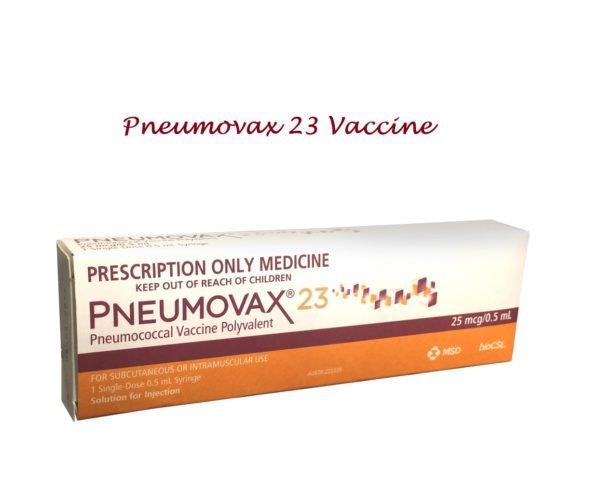Pneumovax 23 vaccine is a capsular polysaccharide vaccine against 23 of the most common strains of pneumococcal bacteria. It induces active immunity and is recommended for use in children, persons over 50, and people who are more susceptible to the 23 serotypes of pneumococcal illness.
Pneumovax 23 recommendations - Who should get vaccinated?:
With the following medical problems, the ACIP (Advisory Committee on Immunization Practices) suggests Pneumovax 23:
-
- Children older than 2 years old, teenagers, and adults aged 19 to 64 with asplenia (anatomic or functional), including:
- Splenic dysfunction
- Patients who have had a splenectomy
- Patients with sickle cell disease or other hemoglobinopathies
- Congenital or acquired asplenia
- Older than two-year-old immune-competent kids and teenagers with:
- Chronic heart disease particularly cyanotic congenital heart disease and heart failure
- Diabetes
- Cerebrospinal fluid leaks
- Chronic lung disease includes patients with asthma who are on frequent or high doses of corticosteroids
- cochlear implants
- Immunocompetent adults 19 to 64 years with:
- Alcoholism
- Cigarette smokers
- chronic lung disease including COPD, emphysema, and asthma
- Diabetes
- chronic heart disease including heart failure and cardiomyopathy
- Cerebrospinal fluid leaks
- Chronic liver disease
- Cirrhosis
- Cochlear implants
- Immunodeficient infants and toddlers older than 2 years, teenagers, and adults aged 19 to 64 with:
- Congenital or acquired immunodeficiency includes complement deficiencies, phagocytic diseases, and B or T cell deficiencies (but not chronic granulomatous illness).
- HIV infection
- Chronic renal failure
- Nephrotic syndrome
- Other illnesses necessitating immunosuppressive medications include those requiring radiation treatment and long-term systemic corticosteroids.
- Leukemia, lymphoma, Hodgkin disease, or metastatic malignancies
- Solid-organ transplant
- Multiple myeloma
- All adults older than 65 years of age
- Children older than 2 years old, teenagers, and adults aged 19 to 64 with asplenia (anatomic or functional), including:
Pneumovax 23 Dose in Adults
Pneumovax 23 vaccine Dose:
- Adults 19 to 65 years with an underlying disease that necessitates pneumococcal vaccination:
- 0.5 mL intramuscular or subcutaneous as a single dose.
Dose for Primary vaccination:
- PPSV23 (Pneumovax 23) was not administered after receiving PCV13 previously:
- Pneumovax 23 (PPSV23) should be administered at least 8 weeks following PCV13.
- naive or vaccination status unknown:
- Administer PCV13 followed after 8 weeks by pneumococcal polysaccharide vaccine (Pneumovax 23)
- Previously received PPSV23 (Pneumovax 23) but did not receive PCV13:
- Additional Pneumovax 23 doses are not needed for primary vaccination.
- PCV 13 should be administered one year or later after the last dose of Pneumovax 23.
Pneumovax 23 Dose as Revaccination:
- Adults aged 19 to 64 with asplenia, nephrotic syndrome, chronic renal failure, HIV infection, or those with impaired immune systems:
- If Pneumovax 23 was given without PCV 13, then PCV 13 should be administered after one year of PPSV 23 (a minimum interval of one year is required)
- Revaccination with Pneumovax 23 is recommended after five years of the last dose.
Pneumovax 23 Dose in Children
Dose for primary immunisation in teenagers with medical problems that call for vaccination and youngsters older than two years:
- 0.5 mL administered intramuscularly or subcutaneously in one dosage.
- individuals should first get PCV 13 vaccination followed by Pneumovax 23 vaccination after 8 weeks.
Children who have an underlying medication condition that necessitates Revaccination:
- Revaccination is recommended after 5 years of the last dose.
- Revaccination is recommended in the following groups of patients:
- Functional or anatomic asplenia
- immunocompromised
- Diabetics
- Chronic kidney disease
- Nephrotic syndrome
- HIV infection
- Patients on glucocorticoids or chemotherapy
- Chronic heart failure
- Transplant patients
- Patients with malignancies
Pregnancy Risk Factor C
- It has not yet been tested in pregnant women.
- Pregnancy is safe for inactivated vaccines.
- The vaccine may be given to pregnant women at high risk for pneumococcal infections.
Use of the pneumococcal polysaccharide vaccination during breastfeeding
- It is unknown if the drug will be excreted into breast milk.
- The manufacturer suggests that breastfeeding mothers be given the vaccine with caution.
- It has no impact on the mother's or the child's ability to breastfeed safely and comfortably.
- The vaccine is not supposed to increase the infant's immunity. The recommended schedule should be followed when vaccinating children.
Pneumovax 23 Vaccine Dose in Renal disease:
The manufacturer has not provided any adjustment in the dose in patients with kidney disease.
Pneumovax 23 Vaccine Dose in Liver disease:
The manufacturer has not listed any adjustment in the dose in patients with liver disease.
Side effects:
- Miscellaneous:
- Fever
- Cardiovascular:
- Peripheral Edema (In Injected Extremity)
- Dermatologic:
- Cellulitis
- Skin Rash
- Urticaria
- Central Nervous System:
- Headache
- Malaise
- Chills
- Guillain-Barré Syndrome
- Paresthesia
- Radiculopathy
- Febrile Seizures
- Pain
- Hematologic & Oncologic:
- Leukocytosis
- Lymphadenitis
- Increased C-Reactive Protein
- Hemolytic Anemia
- Lymphadenopathy
- Thrombocytopenia
- Gastrointestinal:
- Nausea
- Vomiting
- Neuromuscular & Skeletal:
- Decreased Range Of Motion (Limb)
- Arthralgia
- Arthritis
- Myalgia
- Weakness
- Local:
- Injection Site Reaction (Erythema, Induration, Local Soreness, Swelling, and Warm Sensation At the Injection Site)
- Hypersensitivity:
- Angioedema
- Anaphylactoid Reaction
- Serum Sickness
Contraindication to Pneumococcal polysaccharide vaccine:
- Severe adverse reactions to the vaccine or any component have been reported. In the event that a person has an allergy to the vaccine, they shouldn't receive it.
Warnings and precautions
-
Anaphylactoid reactions and hypersensitivity reactions
- Administration of the vaccine is associated with anaphylactoid and/or hypersensitivity reactions that may need immediate treatment with epinephrine 1 mg/mL.
- Pneumovax 23 should only be administered to patients who are able to manage anaphylaxis.
-
Syncope
- The vaccine may cause syncope, which can lead to serious secondary injuries (such as a skull injury or intracranial bleeding).
- It is important to administer the vaccine in an area that prevents injuries and allows for syncope by restoring cerebral perfusion.
-
Acute illness:
- A severe or acute condition should not be treated with the vaccine. It should be administered 2 weeks after the acute illness.
-
Bleeding disorders:
- Patients with bleeding disorders should not be given intramuscular vaccines. Hematoma and bleeding may occur at injection sites.
- The appropriate antihemophilic or clotting factors should be given to patients and the vaccine should then be administered as soon as possible.
-
HIV infection
- HIV-positive people need to have their shots right away since they are more likely to get serious illnesses.
-
CSF leakage and pneumococcal meningitis:
- Pneumovax 23 vaccine might not be effective in treating meningitis caused in part by 23 strains of pneumococci. This is true for people who have suffered from cerebrospinal fluid loss, or skull fractures or have had neurosurgical procedures.
-
Cardiovascular disease
- Patients who have significantly compromised cardiovascular health should use it with caution. A systemic response could carry significant danger.
-
Respiratory disease
- Patients suffering from chronic lung disease should be cautious when receiving the vaccine. A severe reaction could pose a serious risk.
-
Splenectomy
- Patients scheduled for splenectomy need to be vaccinated at the latest two weeks before the procedure.
-
Thrombocytopenia purpura:
- Patients with ITP might experience a relapse after vaccination.
Monitor:
- To restore appropriate cerebral perfusion in the event of seizure-like activity linked to syncope, the patient should be kept in the supine or Trendelenburg posture.
- 15 minutes after the vaccination, keep an eye on the patient for anaphylaxis and syncope.
How to administer Pneumovax 23 (Conjugated pneumococcal vaccine)?
- It is administered as an Intramuscular or subcutaneous injection in the deltoid muscle or lateral midthigh.
- It should not be injected intravenously or intradermally since it might result in very severe local responses.
- It should be delivered with a different needle and syringe and should not be combined with other shots or vaccinations.
- To administer the vaccine, make the patient lie down or seated to prevent syncope-related injuries associated with the vaccine.
- Patients who are at risk of bleeding may inject the vaccine subcutaneously.
- Haemophiliac patients should receive Factor VIII and the vaccination soon after the factors are given. A 23 gauge needle should be used to deliver it, and a firm pressure should be sustained for at least two minutes without rubbing.
- Patients on anticoagulants have a similar risk as those with bleeding disorders.
- These patients should be informed of the risks of hematoma from the injection site.
Mechanism of action of Pneumococcal polysaccharide vaccine (Pneumovax 23):
Pneumococcal polysaccharide Polyvalent contains 23 of the known pneumococcal capsular antibodies. More than 90% of all illness isolates in the US are characterised by these 23 antigens. The vaccine can be administered to activate immunization for the 23 serotypes it contains. It is a common condition in adults. Effectiveness of 50 to 80%In preventing invasive pneumonia caused by the 23 serotypes. Antibodies to the 23 serotypes Take 2 - 3 Weeks After its administration, which lasts for five years in the body. A few patients, such as those living with HIV, liver disease and malnutrition, may have an inadequate antibody response. In these cases, a rapid decline of antibodies could occur in certain groups.
Pneumococcal polysaccharide vaccine Brand Names (International):
- Pneumovax 23
- Pneumo 23
- Pneumo 23 Imovax
- Pneumo Novum
- Pneumovax
- Pneumovax 23
- Pneumovax II
- Pnu-Imune 23
Pneumococcal conjugate Vaccine Brand Names in Pakistan:
No Brands Available in Pakistan.

 Injection for familial chylomicronemia syndrome.jpeg)


